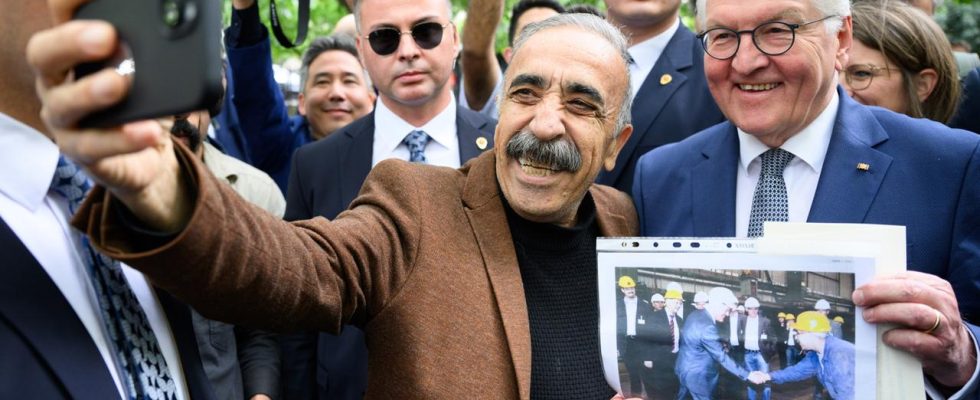It is Federal President Steinmeier’s first visit to Turkey since he took office. He is also concerned with a special chapter of German-Turkish history. However, the start of the trip was disrupted by loud protests.
For the first time in ten years, a Federal President has traveled to Turkey: Frank-Walter Steinmeier will spend three days on the Bosporus. At the start of his visit, Steinmeier praised the lifetime achievements of Turkish migrants in Germany and their contribution to German prosperity.
Today there are almost three million people of Turkish origin living in Germany, “who are helping to shape and shape our society,” said the Federal President during a visit to Istanbul’s Sirekci train station, from where hundreds of thousands of Turkish people have set off for Germany as so-called guest workers since 1961. “They helped build our country, they made it strong and they belong at the heart of our society.”
Steinmeier later recalled in his speech that the German-Turkish migration history also went in the opposite direction. In the 19th century, poverty and unemployment drove craftsmen from Germany to Anatolia. And during the Nazi era, Turkey became a refuge for many German artists and intellectuals.
Hundreds of thousands Guest workers for Germany
“While Germans helped design and build the new capital Ankara in the 1930s of the last century, it was the guest workers from Turkey who helped build the economy of the young Federal Republic since the 1960s and who have now made a decisive contribution to our prosperity for four generations “said Steinmeier.
The governments in Bonn and Ankara signed a recruitment agreement in 1961. According to the Foreign Office, around 876,000 people from Turkey came to Germany on this basis. Many of the so-called guest workers brought their families over and stayed forever. The stories of Turkish-German immigrants are part of our history, said Steinmeier. “They are not people with a migrant background – Germany is a country with a migrant background.”
Doner skewer as a symbol of the contribution of Turkish migrants
In order to trace the stories of the guest workers at the time, Steinmeier invited a number of guests with Turkish roots to accompany him. The restaurateur Arif Keles, who is the third generation to run a kebab shop in Berlin, attracted the most attention. He even took a frozen kebab skewer weighing 60 kilograms, complete with sauces and other ingredients, on the plane to Istanbul to serve it that evening at a reception at the German ambassador’s summer residence.
In the culinary area, the kebab is an example of how much Germany and Turkey have grown together, said Steinmeier. “I like to eat one too.”
The official reason for the visit is the 100th anniversary of the establishment of diplomatic relations between Germany and the Republic of Türkiye.
Meeting with Erdogan only on Wednesday
Steinmeier’s first conversation partner in Turkey was Istanbul’s mayor Ekrem Imamoglu, who is one of the most popular opposition politicians in Turkey. Many Turks critical of the government see Imamoglu as a beacon of hope – and a possible future president.
Steinmeier will only meet the incumbent President Recep Tayyip Erdogan on the third day of his visit to the capital Ankara. In the recent local elections, voters gave Erdogan and his party a lesson. For the first time, the AKP was no longer the strongest force in the country. Instead, the country’s largest opposition party, the CHP, of which Imamoglu is also a member, triumphed.
Bilateral relations at government level have been difficult for years. Germany sees deficits in democracy, the rule of law and human rights in Turkey. In recent years, President Erdogan has regularly responded to such criticism from Germany with undisguised anger.
louder pro-Palestinian protest
Current foreign policy differences include the assessment of the situation in the conflict between Israel and the Palestinians. Erdogan supports the militant Islamist Hamas in the Gaza Strip; he only received Hamas foreign chief Ismail Haniya at the weekend. The EU classifies Hamas as a terrorist organization.
Among other things, the demonstrators showed posters on which portraits of Steinmeier and Adolf Hitler could be seen side by side.
Steinmeier’s start of his visit at Sirekci train station was loudly disrupted by a group of pro-Palestinian demonstrators. The approximately 50 men and women chanted slogans such as “Murderer Germany” and “Genocide Supporters” on a platform from a distance of 50 meters and showed posters on which side by side portraits of Steinmeier and Adolf Hitler as well as the blue Star of David and a red swastika could be seen.
Security forces were unable to push them away. Steinmeier continued his tour of the train station unhindered.
Dietrich Karl Mäurer, ARD Istanbul, tagesschau, April 22, 2024 6:36 p.m

